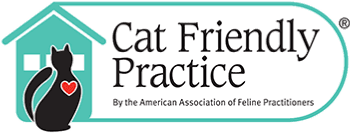Harmony Animal Hospital's Blog
Harmony is a Cat Friendly Practice
Harmony Animal Hospital Implements Cat Friendly Practice Program
Cat Friendly Designation Elevates Cat Care
The cat is king. With cats being the most beloved pet in the country, there is a growing need to improve the health care and overall well-being of the feline population. Whether it’s a routine checkup or special visit, the staff at Harmony Animal Hospital is committed to ensuring that cats get the best care. And, to further its dedication, the clinic recently implemented the Cat Friendly Practice (CFP) program to offer pet owners more at every phase of the cat’s health care process.
“We are committed to providing quality care to our feline patients,” said Dr. Jillian Sweet of Harmony Animal Hospital. “When we heard about the CFP program, we knew it was time to take a fresh look at the practice to determine what could be done to make the veterinary visit more positive for cats and cat owners.”
This Program Puts Cats First
The American Association of Feline Practitioners (AAFP) pioneered the CFP program to provide a framework for creating a positive practice environment for cats, including medical care that supports the cat’s unique needs and knowledgeable staff members who understand feline-friendly handling.
“The AAFP realizes that cats present unique challenges before, during, and after a veterinary visit,” said Dr. Susan Little, DVM, DABVP (Feline) & President, American Association of Feline Practitioners. “Some things that can cause cat anxiety include aversion to carriers, sensitivity to new sights and smells, and the added stress of an unfamiliar location or experience.
Understanding these obstacles helped to shape the CFP program and its dedication to putting the needs of cats first.”
At a CFP-designated clinic, the veterinary staff incorporates cat-friendly features into the physical environment of the practice including special waiting rooms or waiting accommodations, feline-sensitive examination rooms and ward facilities, and equipment appropriate specifically for cats.
Staff members also approach cat care in a different manner. The staff learns how to understand the needs of the cat such as how to interpret a cat’s facial expression and body language. Furthermore, the staff is well-trained in alternate techniques to calm an anxious cat and ensure that exams and procedures do not escalate anxiety.
Harmony Animal Hospital Boosts Cat Care
“We evaluated every aspect of the practice and its environment from the perspective of the cat,” Dr. Sweet said.
“We can proudly say that from the minute they walk through the door, our patients and clients will be part of a welcoming, comfortable experience that will ultimately lead to the improved health of our feline patients.”
For more information about what it means to you and your cat(s) for us to become a Cat Friendly Practice and makes us different from the neighboring veterinary clinics visit: https://catfriendly.com/keep-your-cat-healthy/cat-friendly-practice/
And visit https://catfriendly.com/ so you can learn how you can create a Cat Friendly Home for your feline friend(s),
Fear Free Visits
We just wanted to briefly pinpoint some things that will help make your future veterinary appointments with us be as stress-free as possible for your pet AND you!
- Bring them Hungry! (unless diabetic or otherwise medically unadvised)
-
- MORNING APPOINTMENTS: skip breakfast and wait until you return from your appointment
- DAYTIME APPOINTMENTS: feed a reduced amount of their regular meal
- EVENING APPOINTMENTS: wait until you return home to feed dinner!. If your pet has dietary restrictions (ie: allergies), please bring approved treats with you or even some of your pets dry kibble to be used as treats while at their appointment.
- Carriers: place your pet’s carrier in your living area as far in advance of your appointment as possible. We recommend that the carrier always be left as a fixture of your home to eliminate their reacting negatively to it when it is presented on appointment day. Cats carriers should be covered with a towel or blanket during the drive and when bringing into the appointment. If you need help getting your cat used to his/her carrier here is a great video to watch.
- Leashes: NO Retractable Leashes! Please leave retractables at home! We will happily give you a leash to use during your visit if you do not have anything other than a retractable. If you arrive with one, please keep it LOCKED and ask for a leash from the front desk.
- Waiting: If you feel your pet will be better off NOT waiting in the waiting area, please call upon your arrival and we can move your pet directly to an exam room or you may wait in your vehicle until a nurse is ready for you.
Remember, we want this to be a pleasant experience for your pet AND you! The medical staff may decide to prioritize your pet’s care (ie: treat the ears but skip the nail trim) OR reschedule your appointment with a new treatment plan in order to keep their fear and anxiety level as low as possible. Visit the link for more information on Fear Free practices
We look forward to seeing you!
Dental Care
Your pet’s dental health is extremely important! Veterinary dental care is about more than just preventing “doggy breath” – regular dental care can help prevent serious diseases and infections. Routine dental cleanings are a vital part of your pet’s preventive health care plan.
Your pet has access to the latest veterinary dental technology at our hospital. We use digital dental x-ray equipment in order to better diagnose dental conditions. There are actually about a dozen steps to a veterinary dental visit. We will discuss many of them here.
Why Dental Care Is Important
Plaque and tartar build-up on your pet’s teeth can lead to gingivitis. Reddened, bleeding gums, difficulty chewing and bad breath are all signs of gingivitis. Gingivitis can cause periodontal disease, a bacterial infection that, if left untreated, can potentially damage your pet’s kidneys, heart, and other organs. Regular dental cleanings remove plaque and tartar and prevent gingivitis and periodontal disease.
Dental problems may cause your pet to suffer from:
- Prolonged pain
- Tooth loss
- Chronic infections
- Lowered resistance
- Possible heart, liver and kidney disease
Look for:
- Bad breath
- Drooling
- Yellow or brown discolorations on teeth
- Decreased appetite
We can provide complete and thorough dental cleaning in many pets with NO ANESTHESIA! Ask us about this special service for your pet.
Progressive Nature of Periodontal Disease







